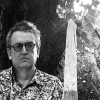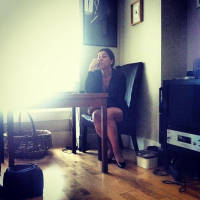Home » Jazz Musicians » Abdullah Ibrahim
Abdullah Ibrahim

Abdullah Ibrahim’s new solo program transcends category, combining the intimate and the universal in a unique way that is hinted at in its title. SENZO means “Ancestor” in both Chinese and Japanese. SENZO also echoes the name of Abdullah Ibrahim’s Sotho father, in whose language the word translates as “Creator”.
Abdullah Ibrahim, South Africa’s most distinguished pianist and a world-respected master musician, was born in 1934 in Cape Town and baptized Adolph Johannes Brand. His early musical memories were of traditional African Khoi-san songs and the Christian hymns, gospel tunes and spirituals that he heard from his grandmother, who was pianist for the local African Methodist Episcopalian church, and his mother, who led the choir. The Cape Town of his childhood was a melting-pot of cultural influences, and the young Dollar Brand, as he became known, was exposed to American jazz, township jive, CapeMalay music, as well as to classical music. Out of this blend of the secular and the religious, the traditional and the modern, developed the distinctive style, harmonies and musical vocabulary that are inimitably his own.
He began piano lessons at the age of seven and made his professional debut at fifteen, playing and later recording with such local groups as the Tuxedo Slickers. He was in the forefront of playing bebop with a Cape Town flavour and 1958 saw the formation of the Dollar Brand Trio. His groundbreaking septet the Jazz Epistles, formed in 1959 (with saxophonist Kippie Moeketsi, trumpeter Hugh Masekela, trombonist Jonas Gwanga, bassist Johnny Gertze and drummer Makaya Ntshoko), recorded the first jazz album by South African musicians. That same year, he met and first performed with vocalist Sathima Bea Benjamin; they were to marry six years later.
After the notorious Sharpeville massacre of 1960, mixed-race bands and audiences were defying the increasingly strict apartheid laws, and jazz symbolized resistance, so the government closed a number of clubs and harassed the musicians. Some members of the Jazz Epistles went to England with the musical King Kong and stayed in exile. These were difficult times in which to sustain musical development in South Africa. In 1962, with Nelson Mandela imprisoned and the ANC banned, Dollar Brand and Sathima Bea Benjamin left the country, joined later by the other trio members Gertze and Ntshoko, and took up a three-year contract at the Club Africana in Zürich. There, in 1963, Sathima persuaded Duke Ellington to listen to them play, which led to a recording session in Paris – Duke Ellington presents the Dollar Brand Trio – and invitations to perform at key European festivals, and on television and radio during the next two years.
Read moreTags
The Abdullah Ibrahim Trio at 92NY

by Paul Reynolds
The Abdullah Ibrahim Trio 92NY New York, NY November 18, 2024 South Africa arguably offers the headiest jazz brew found beyond the borders of the U.S. And since the 2018 death of trumpeter Hugh Masekela, the undisputed elder statesman of the nation's jazz has been Masekela's former '50s Johannesburg band mate, Abdullah Ibrahim. In a career that spans more than 70 years, the pianist's music has epitomized the unique hodgepodge that is the ...
Continue ReadingAbdullah Ibrahim, McCoy Mrubata, Nduduzo Makhathini, Steve Dyer & More

by Ludovico Granvassu
Enjoy a set spotlighting fascinating South African projects, their new albums which do a really great job at showing both where these artists are coming from and how they experiment with their roots in unconventional ways. Happy listening! Playlist Ben Allison “Mondo Jazz Theme (feat. Ted Nash & Pyeng Threadgill)" 0:00 Spirits Rejoice “Emakhaya" Spirits Rejoice! [Reissue] (Frederiksberg) 0:16 Host talks 6:34 McCoy Mrubata & Siyabulela “Oh Yhini--For Winston Ngozi" Lullaby for Khayoyo (AfricArise/Ropeadope) 8:17 Host ...
Continue ReadingSpoleto Festival USA 2023

by Perry Tannenbaum
Spoleto Festival USA Queen Street Playhouse, Sottile Theatre, TD Arena Charleston, SC May 26 to June 11, 2023 Respect for the elders in the jazz lineup of this year's Spoleto Festival USA jazz was gracefully counterbalanced by a hearty welcome to newer generations. It only felt fleetingly like the closing of the book on a previous era when South Africa's iconic pianist-composer Abdullah Ibrahim returned to Charleston, one of the last--if not the very last--headliners ...
Continue ReadingVicenza Jazz 2023

by Libero Farnè
Vicenza Jazz 2023--New Conversations Varie sedi 10--20.5.2023 Almeno due sono state le idee portanti che hanno caratterizzato la ventisettesima edizione di Vicenza Jazz--New Conversations. Innanzi tutto, come ha spesso ripetuto il direttore artistico Riccardo Brazzale nel presentare i concerti, più che in passato si è voluto puntare lo sguardo su proposte rappresentative della ricerca jazzistica più attuale, cogliendo la vitalità di un linguaggio in continua evoluzione, basato su una fertile ibridazione di culture, tendenze, generi ...
Continue ReadingKeep It Big!

by Patrick Burnette
After last episode's extravaganza we decided to keep our focus on larger ensembles for this outing. It's a mix of historical issues (some better engineered than others) and two nearly brand-new releases. What do they have in common? Ain't none of them trios. Pop matters gets historical as we contemplate Pitchfork's deathless mediations on the “oldness" of Steely Dan. Playlist Discussion of Woody Herman's album Moody Woody (Everest) 2:53 Discussion of Abdullah Ibrahim / Dollar Brand's album African ...
Continue ReadingAbdullah Ibrahim: Solotude

by Gareth Thompson
Abdullah Ibrahim once told a seminar at his M7 Academy in Cape Town, “The devil lives on the stage. This is where the ego comes out." On the strength of Solotude, recorded live on his eighty-sixth birthday, Ibrahim has crushed such personal demons and now lets angels guide his performing. One takes his point though, given that even the most spiritual music needs some sense of conceit to create and promote it. But this is an artist with nothing left ...
Continue ReadingJazz From South Africa - Hugh Masakela, Abdullah Ibrahim, Johnny Dyani (1960 - 1978)

by Russell Perry
The brutal repression of the subversive mixed-race jazz subculture in South Africa led to the emigration of several important musicians whose work in the United States and Europe helped focus the world's attention on the apartheid regime in the 1960s and 1970's. Prominent among the emigres are pianist Abdullah Ibrahim, who originally recorded as Dollar Brand, trumpeter Hugh Masekela and bassist Johnny Dyani Playlist Host Intro 0:00 The Jazz Epistles “Vary-Oo-Vum" from Jazz Epistle, Verse 1 (Celluloid) 3:53 ...
Continue ReadingAbdullah Ibrahim: 3

Source:
JazzWax by Marc Myers
When I interviewed pianist Abdullah Ibrahim by phone in South Africa in 2011, he told me how much he looked forward to the arrival of the ice cream truck growing up in Cape Town in the late 1940s. But ice cream was only part of the joy. The truck blared recordings by Louis Jordan and his Tympany Five, music that first exposed him to American jazz. His other big inspirations were the recordings by pianists Jimmy Yancey, Albert Ammons and ...
read more
The Harborfields High School Jazz Band celebrates community in premiering Alan Ferber's arrangement of Abdullah Ibrahim's 'The Wedding'

Source:
All About Jazz
In a time when isolation and distancing seemed to define school settings, the Harborfields High School Jazz Band sought to cut against the grain and promote the joys inherent in the communal nature of music and creative expression. In early 2021, the band’s director—veteran educator and noted jazz journalist Dan Bilawsky—decided to follow through on a long-held ambition to commission an arrangement of Abdullah Ibrahim’s “The Wedding” from three-time GRAMMY-nominated composer/arranger/trombonist Alan Ferber. The beautiful results of Ferber’s writing were ...
read more
Abdullah Ibrahim: The Balance

Source:
JazzWax by Marc Myers
Unlike other forms of popular music, jazz is a product of where artists are from. Each musician's sound is flavored by their environment and surrounding culture. Louis Armstrong had a joyful New Orleans sound, Dizzy Gillespie had the arch flavor of New York, Chet Baker had a relaxed West Coast feel and Howard McGhee had a tough, ambitious Detroit sound. The influence of one's surroundings is impossible to ignore since improvised music comes from one's imagination. Pianist-composer Abdullah Ibrahim is ...
read more
2019 NEA Jazz Masters Will Be Celebrated at Free Concert on April 15, 2019 in Washington, DC

Source:
All About Jazz
Each year, the National Endowment for the Arts bestows the nation’s highest honor in jazz—the NEA Jazz Masters Fellowships—on individuals who have made significant contributions to the art form. Today, the NEA is announcing the four newest recipients of this lifetime honor—Bob Dorough, Abdullah Ibrahim, Maria Schneider, and Stanley Crouch, who is the recipient of the 2019 A.B. Spellman NEA Jazz Masters Fellowship for Jazz Advocacy (bestowed upon an individual who has contributed significantly to the appreciation, knowledge, and advancement ...
read more
StLJN Saturday Video Showcase: Abdullah Ibrahim & Ekaya

Source:
St. Louis Jazz Notes by Dean Minderman
This week, let's check out some videos featuring pianist Abdullah Ibrahim, who will be appearing with his band Ekaya in a concert next Saturday, April 14 at the Sheldon Concert Hall. Born in 1934 in Cape Town, South Africa, Ibrahim grew up under his country's apartheid system of segregation, which was in place from 1948 to 1993. After briefly studying music at the University of Cape Town, in 1959 he formed the Jazz Epistles, a septet that featured the young ...
read more
Enter the "Abdullah Ibrahim - Mukashi (Once Upon a Time)" Giveaway!

Source:
All About Jazz
All About Jazz members are invited to enter the Sunnyside Records “Abdullah Ibrahim - Mukashi (Once Upon a Time)“ giveaway contest starting today. We'll select FIVE winners at the conclusion of the contest on July 7th. Click here to enter the contest (Tracking Abdullah Ibrahim at AAJ automatically enters you in the contest.) Good luck! Your Friends at Sunnyside Records About Mukashi (Once Upon a Time) Establishing a distinctive sound on an instrument is a truly demanding task. ...
read more
Abdullah Ibrahim's "Mukashi" To Be Released On Sunnyside Records On 4/29!

Source:
Bret Sjerven
Establishing a distinctive sound on an instrument is a truly demanding task. Taking the innovations of generations of musicians and channeling these lessons learned into new concepts has become the ultimate goal of every musician. Sometimes unique circumstances help truly gifted artists to evolve, taking in influences from outside sources and native ones. Master pianist Abdullah Ibrahim is one of South Africa’s most celebrated musicians and a wonderful example of a musician who combined the spirit of his homeland’s distinctive ...
read more
Pianist Abdullah Ibrahim Interviewed at All About Jazz

Source:
All About Jazz
For legendary pianist/composer Abdullah Ibrahim, music is always in a state of evolution. This philosophy is common to nearly all great composers, from [pianist] Duke Ellington to [trumpeter] Miles Davis and from [saxophonist] John Coltrane and [pianist] Ahmad Jamal to [guitarist] Bill Frisell. A piece of music is born, it grows and gradually matures but it never withers. And, like the Lesotho mountains, which, in part, inspired Ibrahim to revisit compositions—some of which he penned a quarter of a century ...
read more
Abdullah Ibrahim, Manu Dibango & Others Highlight Brecon Jazz Festival

Source:
All About Jazz
International jazz stars from around the world will be appearing at the 2009 Brecon Jazz Festival in Wales on Friday 7th through Sunday 9th August.
Held in locations across the town of Brecon, the festival will feature South African piano legend Adbullah Ibrahim, Cameroonian saxophonist Manu Dibango and the Tunisian oud master Anouar Brahem. UK Jazz's biggest star, Courtney Pine, will also return to perform his new Sidney Bechet-inspired album, Tradition in Transition.
There will be over 50 talks and ...
read more
Jazz Attuned to the Pace of a Calm, Steady Heartbeat

Source:
Michael Ricci
The South African jazz pianist Abdullah Ibrahim harbors no fondness for disruption. A calm, steady heartbeat nourishes his music, fulfilling a meditative urge. When he works in a solo setting — as on “Senzo,” a gorgeously recorded album released last year on Sunnyside — the result is usually a flowing experience, proceeding without pause from beginning to end. Mr. Ibrahim did his part to transport that aesthetic to Jazz Standard on Tuesday, in his first of three evenings of solo ...
read more


























































